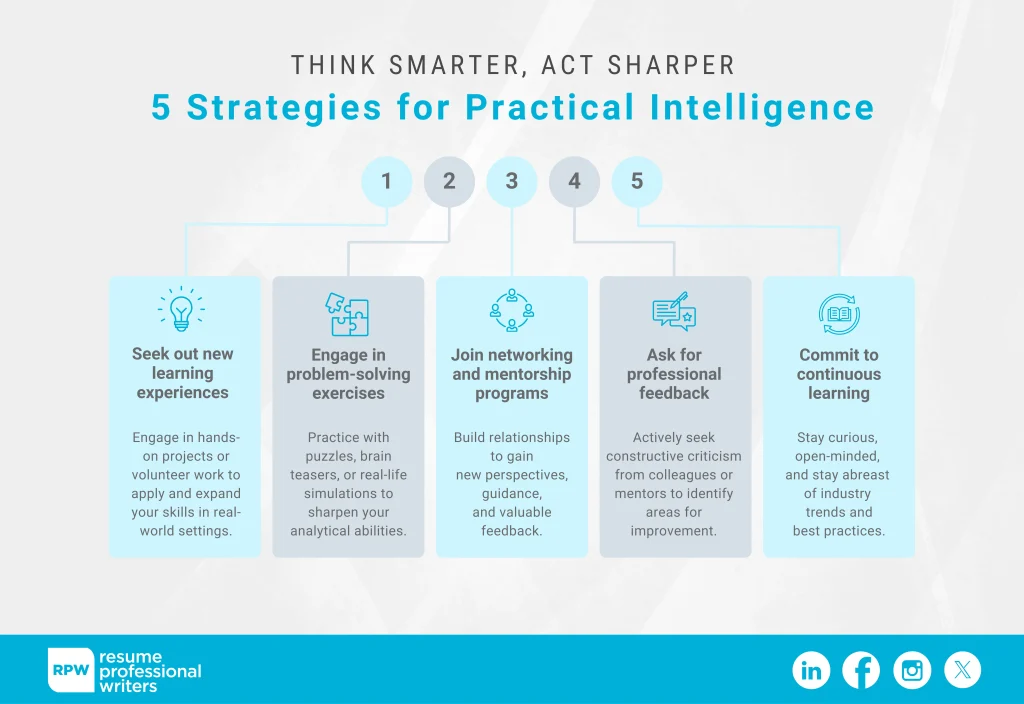In today’s workplace, success often hinges on more than just academic achievements or technical skills. It also requires an elusive quality known as practical intelligence. What does this involve, and how does one develop it to thrive in today’s dynamic professional landscape?
In this blog post, we’ll delve into the concept of this type of intelligence, its significance in professional settings, and actionable strategies to cultivate it effectively. Let’s read on.

What is Practical Intelligence?
Practical intelligence, often referred to as “street smarts” or “everyday intelligence,” is the ability to solve real-world problems efficiently and effectively. It involves using insights gained from personal experiences, tacit knowledge, and common sense to navigate various situations and achieve desired outcomes.
Unlike traditional measures of intelligence, which focus primarily on academic achievements or intelligence quotient scores, practical intelligence emphasizes the application of knowledge and skills in practical, everyday contexts.
Components of Practical Intelligence
Practical intelligence in everyday life comprises several key components, including:
Tacit Knowledge
Tacit knowledge encompasses practical skills which are often difficult to articulate but play a crucial role in problem-solving and decision-making. These include insights, skills, and understanding acquired through personal experiences and interactions with the world.
Common Sense
Common sense refers to one’s ability to make sound judgments and decisions based on practical considerations and everyday experiences. An individual with good common sense applies practical wisdom and intuition to navigate various situations effectively.
Creative Problem-Solving Skills
When one displays creative intelligence, they think innovatively to come up with unique solutions to challenges or obstacles. This skill requires the ability to approach problems from different perspectives, think outside the box, and adapt strategies to changing circumstances.
Adaptability
Adaptability involves being flexible, resilient, and open-minded in the face of uncertainty or adversity. It enables individuals to thrive in dynamic, rapidly changing environments by embracing change, learning from experiences, and adjusting strategies and behaviors accordingly.

Practical Intelligence Examples
Practical intelligence manifests in a wide range of scenarios across diverse industries and professions. Here are a few examples:
Negotiation Skills
Whether discussing deals or negotiating your salary, these skills underscore the ability to understand the needs and motivations of the other individual and adapt their approaches accordingly.
Project Management
In project management, well-developed practical intelligence is essential for anticipating potential risks, identifying resource constraints, and adapting plans to changing circumstances. A skilled project manager draws on their past experiences, industry knowledge, and problem-solving abilities to keep projects on track and deliver results.
Customer Service
In roles that involve frequent interaction with customers or clients, practical intelligence is critical for resolving issues, addressing concerns, and delivering exceptional service. Customer service representatives rely on their communication skills, empathy, and problem-solving abilities to handle inquiries, complaints, and requests effectively.
Emergency Response
First responders, such as paramedics or firefighters, demonstrate practical intelligence in high-pressure situations by assessing risks, prioritizing actions, and making split-second decisions. They draw on their training, experience, and situational awareness to respond swiftly and effectively to emergencies, saving lives and mitigating risks.
Cross-Cultural Communication
In multicultural or international settings, practical intelligence is essential for navigating cultural differences, understanding social norms, and building relationships across diverse backgrounds. Professionals who demonstrate cultural sensitivity, adaptability, and communication skills can effectively collaborate and negotiate with individuals from different cultural backgrounds.

5 Tips to Develop Practical Intelligence Skills
Enhancing practical intelligence is a lifelong journey that requires deliberate effort, practice, and reflection. To help you, here are some strategies to develop and strengthen these skills:
1. Seek out new learning exercises.
Actively seek out new experiences, challenges, and opportunities for growth that allow you to apply and expand your skills in real-world settings. Engage in hands-on projects, volunteer work, or internships that expose you to diverse perspectives, environments, and challenges. Reflect on your experiences, identify lessons learned, and use them to inform future actions and decisions.
2. Engage in problem-solving exercises.
Some activities that require critical thinking, creativity, and problem solving can help you hone your intelligence. These include puzzles, brain teasers, or real-life simulations. Practice analyzing problems, generating solutions, and evaluating outcomes to sharpen your analytical skills and develop your ability to think innovatively. Collaborate with peers or mentors to tackle complex problems and explore different approaches to finding solutions.
3. Join networking and mentorship programs.
Build relationships with peers, mentors, and industry professionals who can offer guidance, advice, and insights into navigating your career path. Networking exposes you to diverse perspectives, experiences, and opportunities, while mentorship provides valuable feedback, support, and encouragement for professional growth and development. Seek out mentors who possess practical intelligence skills and learn from their experiences, strategies, and approaches to problem-solving.
4. Ask for professional feedback.
Seek feedback from colleagues, supervisors, or mentors on your performance, decisions, and problem-solving processes. Actively solicit constructive criticism, identify areas for improvement, and incorporate feedback into your learning and development efforts. Take time to reflect on your experiences, both successes and failures, and analyze the factors that contributed to your outcomes. Use feedback and reflection as opportunities to refine your skills, strategies, and approaches to problem-solving.
5. Commit to continuous learning.
Stay curious, open-minded, and committed to lifelong learning by seeking out opportunities to acquire new knowledge, skills, and experiences. Stay abreast of industry trends, developments, and best practices through reading, research, and participation in professional development activities. Embrace learning as a continuous process of growth, adaptation, and self-improvement, and be proactive in seeking out opportunities for personal and professional development.

Practical Intelligence in the Workplace
In today’s competitive job market, practical intelligence is not just a desirable trait — it’s also a crucial skill that sets professionals apart. Hence, employers increasingly recognize the value this type of intelligence in fostering innovation, driving productivity, and achieving business objectives. Here’s a closer look at how practical intelligence manifests in the workplace and why it’s essential for professional growth and advancement:
Problem-Solving Abilities
One of the hallmarks of everyday intelligence is the ability to solve real-world practical problems effectively. In the workplace, professionals encounter a host of challenges, ranging from technical issues to interpersonal conflicts. Individuals with strong practical intelligence can navigate these challenges with ease, drawing on their experience, creativity, and resourcefulness to find a solution.
Scenario: A project manager faced with a tight deadline and limited resources may tap into their practical intelligence to prioritize tasks, allocate resources efficiently, and overcome obstacles to project completion.
Adaptability and Flexibility
Today, adaptability is key to success, and practical intelligence enables individuals to adapt to new situations, technologies, and roles with agility and confidence. Whether it’s learning a new software system, adjusting to a new team dynamic, or pivoting in response to market trends, these professionals can easily embrace change and thrive in dynamic environments.
Scenario: A marketing professional may need to quickly adapt their strategies in response to shifting consumer preferences or emerging industry trends.
Decision-Making Skills
Effective decision-making is another hallmark of practical intelligence in the workplace. When faced with complex and ambiguous situations that require quick and decisive action, these professionals can weigh various factors, assess risks, and make informed decisions that align with organizational goals and priorities.
Scenario: A sales manager may apply practical intelligence to evaluate competing priorities, anticipate market trends, and allocate resources strategically to maximize sales opportunities.
Interpersonal Skills
Practical intelligence also encompasses strong interpersonal skills, such as communication, empathy, and conflict resolution. In today’s collaborative work environments, professionals must effectively navigate relationships with colleagues, clients, and stakeholders to achieve shared objectives. Practical intelligence enables individuals to build rapport, foster trust, and communicate effectively across diverse teams and cultures.
Scenario: A human resources manager might have to rely on their practical intelligence to mediate conflicts, facilitate productive discussions, and build consensus among team members.
Leadership and Influence
Practical intelligence is also essential for effective leadership and influence in the workplace. Leaders with strong practical intelligence can inspire and motivate their teams, drive innovation, and achieve buy-in for organizational initiatives. They possess a keen understanding of organizational dynamics, power structures, and stakeholder interests, enabling them to navigate complex political environments and drive change effectively.
Scenario: A CEO leading a company through a period of transition needs to communicate a compelling vision, rally support from key stakeholders, and navigate challenges with confidence and resilience. To do so, they might have to use their practical intelligence.
Effectively Highlight Your Practical Intelligence in Your Resume
A resume that highlights your practical intelligence is essential in today’s competitive job market. It showcases your ability to solve real-world problems, adapt to challenges, and drive results. By strategically emphasizing your practical intelligence, you stand out as a top candidate and increase your chances of landing your dream job.
Are you confident with your job search tools? Why not have your resume reviewed for free? Don’t worry — it’s on us! Let our professional resume writers help you craft a compelling resume that focuses on your strengths to propel your career forward. Explore our resume writing services today and unlock new opportunities for success!








